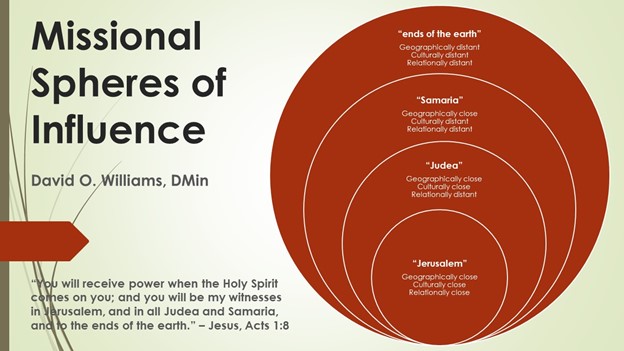Greetings from Home Missions! The Yearly Meeting Sesquicentennial is set to begin, and we have much to celebrate! Have you considered that each and every one of our established churches / meetings was once a mission point? Your Home Missions Board needs the help of the “local historians” among us to gather information about how each one of our churches was started. If you have or know of someone who has this history about your meeting, please email it to cdcorliss@gmail.com. There will also be a Home Missions Board table at this year’s Ministry Conference where information can be given. We can’t wait to have this history gathered together to share at our 2022 Yearly Meeting!
Also, last month we shared about a Home Missions Board challenge for us all during the sesquicentennial year: How can we engage in new ways with our own Jerusalem, Judea, Samaria, and to the ends of the earth? Videos, articles, and other media will be sent out each month to help us with this challenge, and new Facebook and Instagram pages have been started to share ideas, stories, challenges, and to celebrate what God is doing where Friends are engaging in mission. Follow and join the conversation! Facebook: EFCMAYMHomeMissions and Instagram: @homemissions.
As we prepare, let’s first consider what engagement with each of these “places” might look like for us. Below is a helpful picture shared by Dr. Williams:

Engaging with our Jerusalem means engaging with people who are geographically, culturally, and relationally close. This tends to be fairly easy because there are very few barriers to overcome; these folks look, act, and think the way we do. Mission to Jerusalem may simply mean looking for opportunities to engage in closer relationship with those outside the walls of our homes and church buildings. For example, my Tuesday night Bible study might take an opportunity once/month to leave the Sunday School room, meet in a neighborhood coffee shop, and invite our friends and relatives to come and enjoy coffee and conversation with our group. Or I might use my morning walks around the neighborhood to intentionally pray for my neighbors by name and look for opportunities to bless them and grow in relationship. Jerusalem represents “our people.”
Engaging with our Judea means to look for those who are geographically close, culturally close, but relationally distant. We look a little farther out from those we consider “our people” to see others with whom we don’t regularly spend time. This might mean partnering with a ministry or church plant in our Area as a bridge to engaging with people who are relationally distant. We might feel lead as a church to “adopt” or support an Area Home Missions project. My church or small group might offer to become prayer partners, do a service project, or host a shared event together with the project. We might also send a representative to be part of their Partner Advisory Team, who meets online monthly to provide the local leaders with prayer and wisdom during their journey from mission point to full church status. Another example of Judea mission is partnering with a ministry like Family Promise to use our existing church resources to offer hospitality and hope to families in a homeless crisis. If we are already involved in a Judea mission, then we might look for new avenues to join in the work God is doing there.
Samaria represents people who are geographically close but both culturally and relationally distant. Engagement here is more difficult as it requires us to move even further out of our comfort zones and beyond the social patterns, cuisine, and possibly the language to which we are accustomed. To engage in mission in Samaria we must be present with a posture of listener and learner before anything else. We must assume that God is already at work among the people, and our role is to find out how to join Him. I might start to engage here by regularly patronizing a store or restaurant that is run by people of a different culture. My church might decide to partner or engage in new ways with one of our EFC-MAYM cross-cultural churches or Home Missions projects. With Friends in Mid-America whose first language is Spanish, Nepali, French, and Swahili (multiple dialects), just to name a few, we have multiple opportunities to partner in mission to Samaria. And it will most certainly mean rich new learning and growing for those of us who are willing to engage.
Engaging in mission with the ends of the earth is potentially the most challenging because the people are geographically, culturally, and relationally distant. Fortunately for us in EFC-MAYM, we have a great heritage of sending missionaries to the ends of the earth, and they bring us opportunities to be a part of God’s redemptive work on the ground around the world. My church might adopt an EFM mission field, or I might financially support a missionary or consider future missionary opportunities. Through EFM’s Five-Year Goal to send 10 missionary households to launch 5 new mission fields in the next 5 years, the new opportunities to join in mission to the ends of the earth are many. Learn more here: Friends Mission Five Year Goal.
Mission to Jerusalem, Judea and Samaria, and the ends of the earth is a high calling for each and every one of us. It’s amazing that God invites us to join Him on mission fields near and far, to be agents of restoration and healing. Where is God inviting you to join Him?
-Carrie Corliss
Home Missions Board Chair
Follow Us!